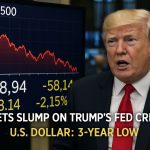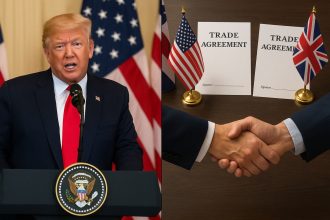Imagine you’ve spent months planning the perfect wedding, down to the last detail, only to have the venue cancel at the eleventh hour because of a sudden storm. That’s the kind of disruption tech giants like Klarna, Chime, and StubHub faced when they were forced to postpone their highly anticipated initial public offerings (IPOs). The culprit? A market meltdown sparked by President Trump’s sweeping tariff announcements in April 2025. As a journalist who’s been covering tech for a decade, I’ve seen IPOs light up the market like rock concerts, but right now, it feels more like everyone’s scrambling for cover under a thunderstorm.
The Trade War Trigger: A Market in Free Fall
On April 2, 2025, President Trump announced a bold trade policy, imposing a 10% baseline tariff on all imported goods, with targeted increases for countries like China, Taiwan, and India (White House Fact Sheet). The goal was to address trade imbalances and bolster American industries, but the immediate effect was chaos in the financial markets. The S&P 500 plummeted nearly 5% in a single day, and over two days, Wall Street saw a staggering $6.6 trillion in value wiped out (FinTech Weekly). Tech and fintech stocks, which rely heavily on global supply chains, were hit especially hard.
This wasn’t just a blip. The Nasdaq faced its worst week since the early days of the COVID-19 pandemic in 2020 (CNBC). For companies like Klarna, Chime, and StubHub, which had been meticulously preparing to go public, the timing couldn’t have been worse. The market volatility made it clear: launching an IPO in such conditions was like trying to sail a paper boat in a hurricane.
Why Delay an IPO? The Risks of Going Public in a Storm
Going public is a monumental step for any company. It’s a chance to raise capital, expand operations, and cement a place in the market. But it’s also a high-stakes gamble that requires investor confidence and stable conditions. When markets are as turbulent as they were in April 2025, companies face several risks:
- Uncertain Valuations: Volatile markets make it hard to predict how much a company’s shares will be worth, potentially leading to lower-than-expected valuations.
- Investor Hesitation: During economic uncertainty, investors are less likely to pour money into new offerings, preferring safer bets.
- Risk of Failure: A poorly received IPO can damage a company’s reputation and financial standing, making future attempts even harder.
Klarna, Chime, and StubHub, each poised to raise at least $1 billion, decided that discretion was the better part of valor. By delaying their IPOs, they’re betting on calmer waters ahead, even if it means putting growth plans on hold.
Klarna: A Fintech Giant Pauses Its Big Moment
Klarna, the Swedish fintech darling known for its “buy now, pay later” services, had been building momentum for its IPO. The company filed its registration statement with the SEC, eyeing a valuation of over $15 billion (Investopedia). They were set to kick off their investor roadshow in early April, but the tariff-induced market plunge changed everything. Sources told The Wall Street Journal that Klarna opted to postpone, with no clear timeline for resuming (TechCrunch). For a company that’s been navigating a rollercoaster of valuations—from $46 billion in 2021 to $6.7 billion in 2022—this delay is a cautious move to protect its market debut.
Chime: Digital Banking Dreams on Hold
Chime, a digital banking platform with over 20 million customers, was another fintech star ready to shine. Known for its fee-free services, Chime had filed its IPO prospectus and was banking on the growing appetite for digital financial solutions (Tearsheet). But the market turmoil following the tariff announcement made it clear that now wasn’t the time. The Wall Street Journal reported that Chime, like Klarna, chose to delay its IPO, citing the unprecedented market conditions (TalkMarkets). For Chime, this pause is about ensuring a strong debut when conditions are more favorable.
StubHub: Missing the Live Event Boom
StubHub, the online ticket marketplace, had big plans to capitalize on the resurgence of live events. With a valuation estimated at $16.5 billion, the company filed for its IPO in March 2025, aiming to raise at least $1 billion (U.S. News). But the tariff turmoil derailed those plans. StubHub canceled its investor roadshow, concerned that the volatile market would overshadow its pitch (Forbes). For a company that thrives on the excitement of concerts and sports, this delay is a reminder that even the hottest tickets can’t sell in a storm.
The Bigger Picture: Economic Ripples and Market Confidence
These IPO delays aren’t just a headache for Klarna, Chime, and StubHub—they’re a red flag for the broader economy. IPOs are a barometer of market confidence, and when major players hit pause, it signals uncertainty that could ripple across industries. The venture capital world, already under pressure, is feeling the pinch, with firms struggling to raise capital in a turbulent market (CNBC). This could slow innovation, limit job creation, and dampen economic growth.
The tariffs themselves are part of a larger strategy to protect American industries and address trade deficits, as outlined by the Trump administration (Wikipedia). But the short-term cost has been steep, with global markets reeling and companies rethinking their strategies. For investors, the volatility underscores the need for caution and access to reliable tools to navigate these choppy waters.
A Trading Tool for Turbulent Times
Speaking of navigating markets, I was chatting with a colleague the other day who mentioned a platform that’s been a game-changer for some traders. PocketOption, with its user-friendly interface and educational resources, is gaining traction among those looking to make informed decisions in volatile times. If you’re curious about staying ahead in this unpredictable market, it might be worth a look at PocketOption.
When Will the Market Stabilize?
So, when might we see these IPOs back on track? It’s a tough question, and even the experts are hedging their bets. Some suggest that the market could stabilize if there’s clarity on the tariff policies—perhaps if the 90-day pause on certain tariffs leads to a softer stance (BBC). Others warn that prolonged trade tensions could keep markets volatile for months (Tax Foundation). For now, companies like Klarna, Chime, and StubHub are in a holding pattern, waiting for the storm to pass.
A Personal Reflection: From Rock Concerts to Thunderstorms
I’ve been covering the tech industry for a decade, and I still remember the electric buzz of IPOs in the early days. They were like rock concerts, with investors and founders riding a wave of excitement. But lately, it feels more like a thunderstorm, with everyone ducking for cover. It’s a stark contrast, and it makes me wonder about the long-term impact on innovation. For aspiring entrepreneurs, my advice is to use this time to build a solid foundation. A great product is only half the battle—timing your market entry is just as crucial. Patience might just be the secret weapon in these uncertain times.
What’s Next? Your Thoughts Matter
The delays by Klarna, Chime, and StubHub are a wake-up call about how quickly global events can shake up the financial world. As we navigate this uncertainty, staying informed and adaptable is key. So, what do you think? Did these companies make the right call by delaying their IPOs? How are you handling the market volatility? Drop your thoughts in the comments—I’d love to hear your take.
| Company | Industry | Planned IPO Date | Reason for Delay | Estimated Valuation |
|---|---|---|---|---|
| Klarna | Fintech | April 2025 | Market volatility due to tariffs | $15 billion+ |
| Chime | Fintech | April 2025 | Market turmoil from tariff announcement | Not disclosed |
| StubHub | Ticketing | April 2025 | Unstable market conditions | $16.5 billion |





